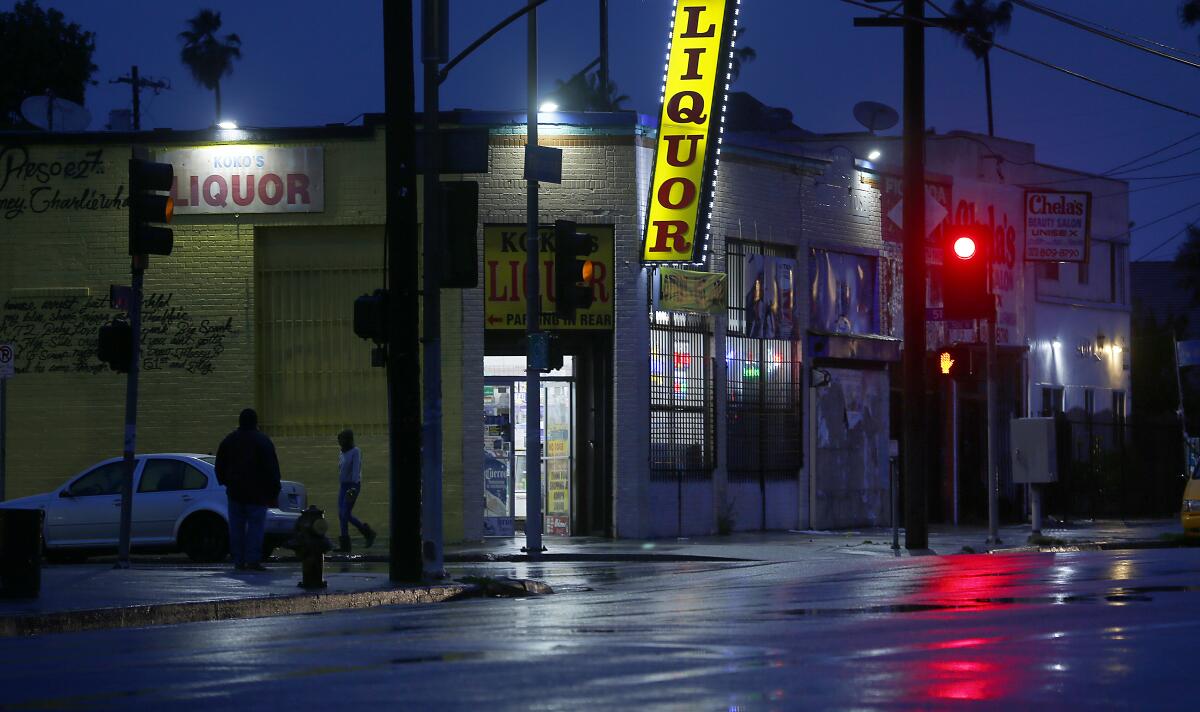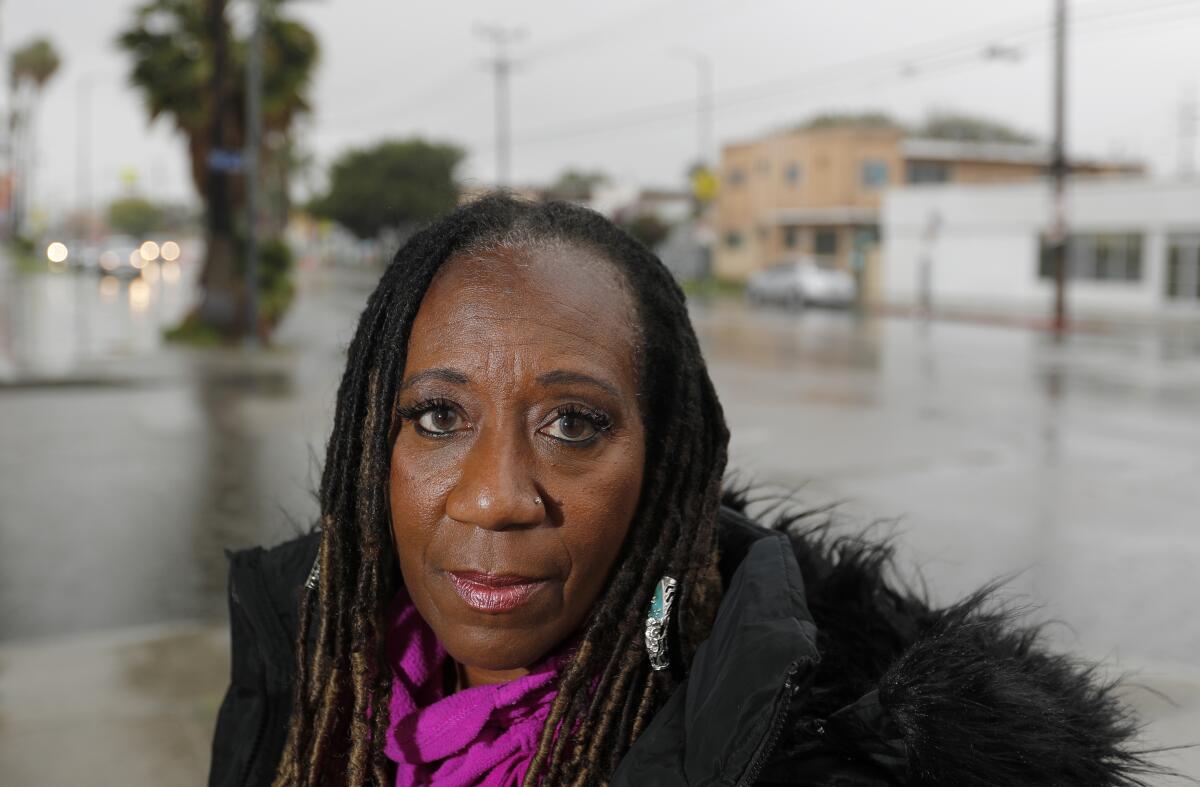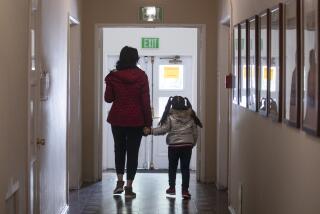Coronavirus fears haven’t stopped the sex trade on Los Angeles streets

- Share via
Armed with condoms and disposable thermometers, the outreach workers ventured out to streets in South Los Angeles notorious for sex trade activity.
They expected that some women would still be working on this chilly Friday night in early April. But what they saw caught them off guard.
Two weeks into the mandated stay-at-home orders designed to curb the coronavirus pandemic, not only were sex workers out in pre-quarantine numbers — the johns were, too.
“It was business as usual,” said Stephany Powell, executive director of Journey Out, an L.A.-based nonprofit that helps victims of sex trafficking.
The pandemic is devastating the global economy, and it has not spared sex workers. Strippers, escorts and porn performers are experiencing financial hardships, and many have turned to webcam sites or relief funds to scrape by.

But for those selling sex on the streets, by far the most vulnerable population in the industry, there are fewer options. Many have to work to survive during the pandemic, and they are finding that some customers are still seeking them out, apparently willing to share the risk.
Many of those selling sex on the streets tell advocates they have little to no choice but to continue doing high-risk work that has only become more fraught during this health crisis.
“When you talk to them about the coronavirus, they’re aware of it, and they’re afraid of it like everybody else,” Powell said of the workers. “If you’re out there right now, you’re really being pushed to be out there, whether that push factor is poverty or somebody making you.”
On any given prostitution stroll, there’s a mix of those who have been coerced by sex traffickers and those who are in the life by choice. But even in those cases, many are held captive by forces including discrimination, abject poverty and the need to provide for their families.
Many street sex workers lack high school diplomas, are undocumented, have extensive criminal records and are victims of abuse, according to advocates. It’s difficult for them to find work in the best of times, and they aren’t privy to the social safety nets available to most others during an economic recession.
Housing vouchers, food stamps, Medicaid, or other forms of welfare are also hard to come by for anyone earning income from sex work. And they are often ostracized by or isolated from resources like family, church and other community organizations.
With almost nowhere to turn, they face grim options: Work the streets or starve. Work the streets or face the wrath of pimps or traffickers.
“Struggle is what we do. Danger is what we face,” said Stephanie Grant, a survivor of sex trafficking and crisis counselor at Journey Out. “Our circumstances are regularly very dire, and every day we face life-and-death decisions. The [coronavirus] is just another danger added to the pot.”
Some of the johns who continue to solicit services amid the pandemic have taken advantage of the situation, demanding that they pay less money and seeking riskier services, according to advocates.
One young woman got into a car with a man wearing a mask and gloves. He insisted she sanitize her hands before touching him, said Grant.
“Clients are demonstrating that they believe their lives are more valuable than those of the woman they engage with,” she said.
Grant holds daily Zoom meetings with about a dozen women who work on the streets. “About half are still out there, doing what they need to do,” she said.
In L.A., the pressure to be on the streets is compounded by increased demand for full-service sex work. Advocates aren’t certain what’s driving the increase but say it could be due to a combination of boredom and anxiety.
“Even if some clients are moving to remote sex work, the overall effect of everyone being stuck at home and stressed out has been to increase demand, and all of the commercial establishments that people could visit for erotic titillation or satisfaction are closed,” said Ashley Madness, political action director for the Sex Workers Outreach Project’s L.A. chapter.
Although demand for street prostitution may eventually decrease as more people experience job losses and reduced wages, pimps may cut prices to stimulate demand, just like an airline or restaurant might, said Siddharth Kara, an expert on human trafficking and a visiting scientist at the Harvard School of Public Health.
Sex workers say they were already facing more dangerous conditions after laws were passed in 2018 that made it illegal to advertise sex work online, according to advocates. Before, sex workers say, they could screen potential clients on sites like Backpage, which was shut down after being linked to the sex trafficking of underage girls.
Though the Fight Online Sex Trafficking Act and Stop Enabling Sex Traffickers Act were billed as a way to protect sex workers, the new restrictions have effectively pushed more of them onto the streets, according to some advocates.
Another concerning pattern also emerged: More workers returned to abusive or exploitative managers to survive.
Advocates say that pandemic-related job losses also are driving former sex workers back to the streets.
Harmony Grillo, the executive director of Treasures, an outreach and support organization for those in the sex industry, noted that some of the women she worked with had done just that as the income they made through the gig economy and service jobs evaporated.
“If we’re in fear, if our financial future is uncertain, we want to go back to what’s familiar,” Grillo said. “It’s heartbreaking to watch people who’ve fought so hard to leave be sucked back in by this.”
Advocates worry that, as economic conditions worsen, traffickers will force their victims to work more hours and cajole them into riskier behavior.
“Traffickers and pimps will use whatever vulnerabilities they can,” Kara said, “to exert, coerce and extend the exploitation of women and girls.”
With the help of Treasures, women who feel particularly susceptible to the pull of sex work have created their own online accountability group, checking in on a daily basis to encourage one another to stay strong in the face of mounting uncertainty.
“Many of the women developed post-traumatic stress disorder while in the life,” Grillo said. And being confined and isolated in their homes has revived memories of the conditions they experienced while under the control of pimps. The flashbacks have prompted nightmares and panic attacks.
The Los Angeles Police Department confirms that the sex work on L.A.’s streets continues unabated. The department does not have specific plans to address the issue, according to Capt. Gisselle Espinoza, though officers have worked with advocacy groups like Journey Out to “increase awareness of good sanitation habits.”
“We are doing our regular traffic enforcement in areas that warrant it,” Espinoza said. “Enforcement remains status quo.”
Elsewhere in California, some commercial sex corridors are dark.
Johns in San Francisco have mostly stayed away from the strolls in the Mission District and the Tenderloin, said Celestina Pearl, outreach manager at St. James Infirmary, which provides clinical and social services to sex workers in the Bay Area.
“Casual johns might go out to the strolls once in a while,” Pearl said. “Right now they’re like, ‘I’m just definitely not going to.’”
St. James Infirmary surveys street workers to gauge their needs at any given time. Before the pandemic, many asked for pepper spray, Pearl said. But now they just need cash and supplies, like hygiene products and condoms.
In Los Angeles, many need housing. Jazzmun Crayton, senior manager of strategic partnerships with the Asian Pacific AIDS Intervention Team, has spent the past few weeks finding beds for unhoused sex workers. She’s been able to get six women into shelters.
One woman visited Crayton recently to say she hadn’t been working the streets and was taking social distancing measures seriously.
Crayton beamed. She knew it was a big deal.
Against all odds, the woman was protecting herself.
More to Read
Sign up for Essential California
The most important California stories and recommendations in your inbox every morning.
You may occasionally receive promotional content from the Los Angeles Times.














